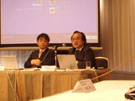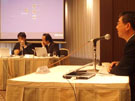Future of Japan's ICT Business
Takahiro MIYAO (Professor and Head, Japanese Institute of Global Communications, IUJ)
| GLOCOM's Quarterly Seminar Series (Kenkyu Kyoryoku Iinkai)
|
| Date/Time: | February 8, 2008; 10:00 – 12:30 |
| Place: | Tokyo Kaikan, Marunouchi, Chiyoda-ku, Tokyo |
| Program: |
10:00 - 11:00
Main Theme: Future of Japan's ICT Business
Speakers: Mr. Waichi Sekiguchi (Nikkei Shimbun) and Mr. Takuo Imagawa (Ministry of General Affairs & Communications)
Moderator: Prof. Hiroshi Nakajima (Professor, GLOCOM)
11:00 - 12:30
Q&A:
|
| Sponsor: | GLOCOM, International University of Japan |
 Mr. Waichi Sekiguchi (Nippon Keizai Shimbun) and Mr. Takuo Imagawa (Ministry of Internal Affairs & Communications) made presentations on "the future of Japan's ICT Business," moderated by Prof. Hiroshi Nakajima (GLOCOM), at the February meeting of GLOCOM's Quarterly Seminar Series (Kenkyu Kyoryoku Iinkai), which was held at Tokyo Kaikan in Marunouchi on February 8(F), 10:00-12:30. Mr. Waichi Sekiguchi (Nippon Keizai Shimbun) and Mr. Takuo Imagawa (Ministry of Internal Affairs & Communications) made presentations on "the future of Japan's ICT Business," moderated by Prof. Hiroshi Nakajima (GLOCOM), at the February meeting of GLOCOM's Quarterly Seminar Series (Kenkyu Kyoryoku Iinkai), which was held at Tokyo Kaikan in Marunouchi on February 8(F), 10:00-12:30.
First, Mr. Sekiguchi examines current trends in ICT business, which seems shifting toward business models emphasizing "search, mobile and wireless," as suggested by recent moves by Microsoft and other players in the global market. This might be called a new world of "mobile 2.0" or "web 3.0," where there would be more mobile business to be created and more progress in the merger of communications and broadcasting to take place, given that information explosion is somehow contained.
In Japan, however, ICT is yet to be effectively utilized in such key areas as education, government, medical service, etc., and necessary reforms in legacy communications, broadcasting and legal systems seem to be delayed. A more global and strategic approach to ICT is needed in order to turn around recent declining trends in Japan's competitiveness and productivity, according to Mr. Sekiguchi.
 Next, Mr. Imagawa poses the following three key questions about Japan's ICT industry: (1) Is it useful for every citizen? (2) Is it strong globally? (3) Is it reinventing itself? In order to answer to these questions positively, we need the following: (1) some kind of trigger to open a new era of "digital civilization," (2) bold business strategies involving industry-wide reorganization, (3) structural reforms to make Japan's ICT globally competitive. Mr. Imagawa concludes that market competition should be encouraged in order for any of these things to happen in Japan's ICT industry, with due consideration given to the "publicness" of communications and contents. Next, Mr. Imagawa poses the following three key questions about Japan's ICT industry: (1) Is it useful for every citizen? (2) Is it strong globally? (3) Is it reinventing itself? In order to answer to these questions positively, we need the following: (1) some kind of trigger to open a new era of "digital civilization," (2) bold business strategies involving industry-wide reorganization, (3) structural reforms to make Japan's ICT globally competitive. Mr. Imagawa concludes that market competition should be encouraged in order for any of these things to happen in Japan's ICT industry, with due consideration given to the "publicness" of communications and contents.
A free discussion after the presentations centered around the question of why Japan seems losing its global position in this field these days, and possible reasons, including unfortunate historical incidents and lack of internationally oriented education and training in ICT business, were pointed out. Needless to say, it is more difficult to find answers than to ask questions in this regard.
References:
Waichi Sekiguchi:
http://www.nikkei.co.jp/hensei/ngmf2005/r_sekiguchi.html
Takuo Imagawa:
http://www.pp.u-tokyo.ac.jp/faculty/professors/TakuoImagawa.htm
This report is adopted from the following blog (with its Japanese translation):
http://glocom.blog59.fc2.com/blog-date-20080208.html
|





